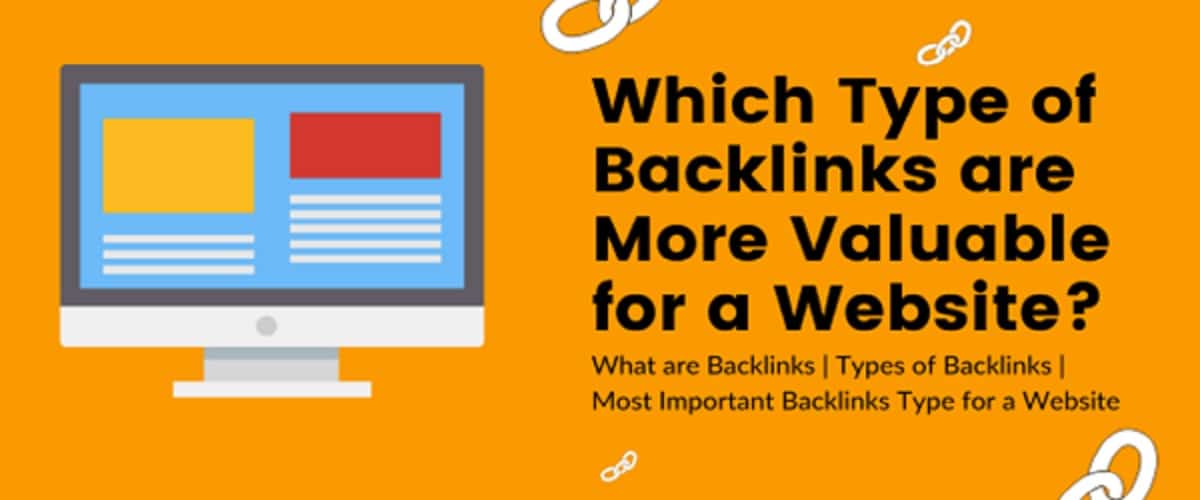Visibility and authority are two of the essential qualities of a website. A site with good visibility and authority impacts more people, attracts more traffic and reaches people. So, if a digital marketer has spent some time developing a website and creating content for this purpose, he might wonder which type of backlinks are more valuable for a website. That’s where this blog post will come in handy.
Before answering the question, let’s start this blog post from scratch by discussing what backlinks are and the types of backlinks. Thus, without any further delay, let’s dive in.
What are Backlinks and Why are They Important?
Search engines like Google have more than 200 ranking factors. But having backlinks is still the most important one.
The links of a web page from one website to another website are known as backlinks in SEO. From the receiving end, backlinks are perceived as inbound or incoming links, whereas from the linking side, backlinks are called external, outgoing, or outbound links.
Digital marketers must have backlinks to get a website indexed in search engines because finding a website without backlinks is challenging unless it is relevant to a specific niche. So, let’s see three factors to understand the importance of backlinks:
- Backlinks help increase the number of website visitors through referral traffic.
- It (backlinks) helps the search engines determine which web page should rank higher for a specific query.
- Backlinks make it quicker for search engines to discover your web pages.
What are the types of backlinks?
There are several types of backlinks and it is impossible to provide a definite number for the kinds of backlinks in SEO. However, let’s discuss the two major types of backlinks in off page SEO before naming the most valuable backlinks for a website.
1. No-follow:
The no-follow links are typically affiliate or paid links because there is no intention of helping the website rank higher in search engines. Web admins mostly use no-follow links for advertising.
Web admins and SEO experts inform the search engines about the no-follow links through the following script:
<a href=“https://nofollowlinkexample.com (URL of the link)” rel=“nofollow”>This is a no-follow link(Anchor text of the link)</a>
Some most common types of no-follow links are:
- Getting backlinks from irrelevant websites.
- Backlinks in the comment section.
- Paid links.
2. Do-follow:
A do-follow link informs the search engines that the intention of linking to a particular website is passing the link juice and having that specific website rank higher in search engines. These links increase a website’s authority because they inform the search engines about the other linking blog posts and websites to your website.
Unlike no-follow links, there is no need to add the relationship attribute. So, search engines automatically consider the links with no relationship attribute as do-follow links.
Thus, web admins and SEO experts inform the search engines about the do-follow links through the following script:
<a href=“https://dofollowlinkexample.com (URL of the link)” >This is a no-follow link(Anchor text of the link)</a>
Some most common types of do-follow links are:
- Editorial backlinks.
- Relationship-based backlinks.
- Niche directories.
- Guest blogging backlinks.
Which Type of Backlinks are More Valuable for a Website?
The short answer to this question is ‘organic backlinks’ (or do-follow links). Organic backlinks come naturally to a website from an authoritative and relevant source. In the terminologies of SEO, getting organic backlinks is also known as the organic form of link building.
Several other types of backlinks fall under the category of organic link-building strategy. Some most common examples of backlinks in organic backlinking strategy are:
1. Editorial backlinks:
Editorial backlinking is the purest form of backlinking strategy. That is why every search engine loves this type of backlink.
This backlinking strategy occurs when someone creates a backlink to your website from a credible source, such as a well-known blog or publication. There is nothing spammy about editorial links because such a backlinking type happens naturally or organically.
For instance, when the content of your website or blog impresses another blogger or journalist, he will create a link to your website, which is a prime example of editorial backlinks. In the case of editorial backlinks, the website owner won’t even know about backlink creation until it is done.
2. Relationship-based backlinks:
As the name depicts, the relationship-based backlinking strategy occurs due to a personal relationship. This relationship could be established when a content creator sees that a particular blog or website owner creates genuine content. So, he makes a backlink to that specific blog or website.
However, relationship-based backlinks are only effective if they have the same value or genuineness. Otherwise, such types of backlinks are useless.
3. Niche directories:
In SEO, when someone hears the term ‘directories,’ they instantly think of the bane of the SEO world. However, this situation is primarily true for ‘general directories’ because they are dead and SEO experts or web admins should avoid them at all costs.
As far as niche directories are concerned, they are a bit different than general directories because they can be fruitful to the local SEO of a website or blog. But niche directories are only valuable if the focus is on using respected and established niche directories. Some examples of high-quality niche directories that can be fruitful for your website or blog are:
- Best of the Web.
- Better Business Bureau.
- Yellow Pages.
However, SEO experts and web admins should avoid the things that make niche directories spammy backlinks, such as using automated descriptions and copy-pasting. Instead, they should focus on writing unique descriptions for each to avoid the penalties of search engines.
Thus, high-quality niche directories can be a great source of generating powerful backlinks to your website.
4. Guest blogging backlinks:
Back in 2020, Google cracked down on several guest-posting websites that were focusing on creating backlinks through this strategy instead of providing value to readers. Therefore, some SEO experts disregard this backlinking strategy because of Google’s crackdown.
However, if a guest blog post provides genuine and high-quality content to its readers, there is no harm in using that guest blog post to reach a higher audience and expand your brand. So, building backlinks through guest blog posts should not be the primary goal of an SEO expert or website owner. Instead, he should consider backlinks a by-product of guest blogging.
Organic backlinking makes a website more credible and authoritative in the eyes of search engines. That is why web pages with more organic backlinks have a higher boost ratio in the SERPs (Search Engine Results Pages) than other types of backlinks.
However, generating organic backlinks is SEO’s most challenging and time-consuming link-building strategy. That is why most SEO experts turn to spammy and other link-building techniques.
Thus, to increase the authority of a website and make it more relevant in a particular niche, SEO experts avoid no-follow links because search engines, especially Google, now consider no-follow links spammy. That is why if a blogger or SEO expert has accidentally used no-follow links, he should instantly avoid those links and check the authority of his website with the help of DA PA Checker tools.
Bottom Line – the Conclusion:
To sum up, all the types of backlinks fall under two categories: do-follow and no-follow. Do-follow links bring fruits to a website because they are organic. On the other hand, avoiding no-follow links is in the best interest of SEO experts and web admins because they are sponsored links.
Everyone should know that backlinks are of great value for website owners. They can increase the ranking of websites in search engines and attract new visitors to a website. However, the benefits of backlinks are only helpful if chosen correctly.
About Author: Eiswan Ali Kazmi is a passionate content writer and blogger for Prepostseo. Being devoted to making a difference through his publications, he chose to blog as a career during his academic years. Compiling his knowledge of Information Technology, he is pursuing to present technological solutions through his writings. You can know more about him in Linkedin.




Yahoo Search Engine: Overview and Features
PPC VS SEO: Which One Should You Go for?